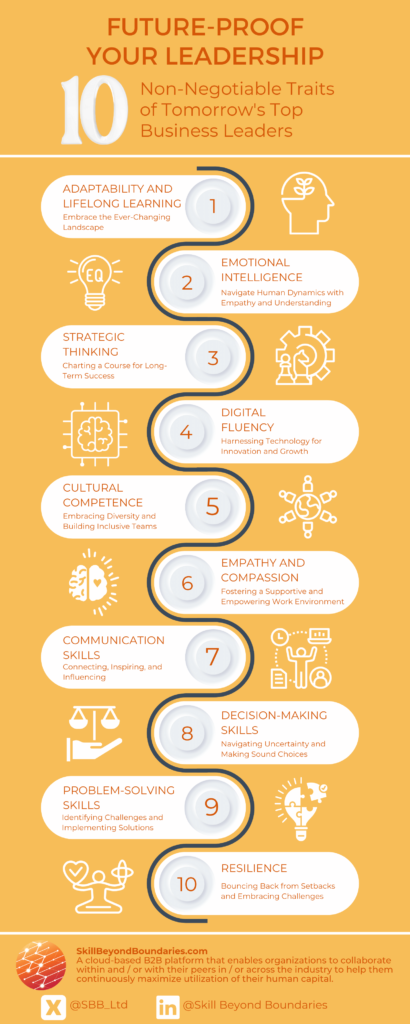Future-Proof Your Leadership: The Non-Negotiable Traits of Tomorrow’s Top Business Leaders
The world of work is undergoing a rapid transformation driven by technological advancements, globalization, and evolving customer expectations. To navigate this dynamic landscape and lead organizations into a successful future, business leaders must equip themselves with unique skills that extend beyond traditional management practices.


1. Adaptability and Lifelong Learning: Embracing the Ever-Changing Landscape
The pace of change is accelerating, and businesses need leaders who can quickly adapt to new technologies, market trends, and customer needs. This requires a commitment to lifelong learning and a willingness to embrace new ideas.
According to a recent survey by the World Economic Forum, 50% of all employees will need to reskill or upskill by 2025. This highlights the crucial role of lifelong learning for leaders who must stay ahead of the curve and guide their organizations through periods of disruption.
“The only way to do great work is to love what you do. If you haven’t found it yet, keep looking. Don’t settle.” – Steve Jobs, CEO of Apple
2. Emotional Intelligence: Navigating Human Dynamics with Empathy and Understanding
Emotional intelligence (EQ) has emerged as a critical competency for business leaders, enabling them to build strong relationships, foster collaboration, and effectively manage conflict.
A study by the Hay Group found that EQ is twice as important as IQ for predicting leadership success. EQ allows leaders to connect with their employees on a personal level, build trust, and create a positive work environment.
Leadership is not about titles, positions, or flow charts. It is about one life influencing another.’ – John C. Maxwell
3. Strategic Thinking: Charting a Course for Long-Term Success
Leaders need to be able to see the big picture and develop strategies that align with the organization’s long-term goals. This requires strong analytical skills and the ability to think creatively.
A study by the Harvard Business Review found that only 37% of executives are confident in their ability to develop a successful strategy. This suggests that many leaders need to develop their strategic thinking skills in order to be successful in the future of work.
4. Digital Fluency: Harnessing Technology for Innovation and Growth
Technology permeates every aspect of business, making digital fluency an essential skill for leaders. This includes understanding the basics of artificial intelligence, data analytics, and cybersecurity.
A study by Deloitte found that 80% of organizations plan to increase their investment in digital technologies in the next year. Leaders need to be prepared to lead their organizations through this digital transformation.
5. Cultural Competence: Embracing Diversity and Building Inclusive Teams
Businesses are operating in an increasingly globalized world, and leaders need to be able to work effectively with people from different cultures. This requires cultural sensitivity and the ability to build trust with people from diverse backgrounds.
A study by the Center for Talent Innovation found that 80% of organizations believe that cultural competence is a critical leadership skill. Cultural competence allows leaders to build relationships with people from different cultures, understand their needs, and motivate them to achieve their goals.
6. Empathy and Compassion: Fostering a Supportive and Empowering Work Environment
The future of work is about empowering people, and leaders need to be able to empathize with their employees and create a supportive work environment. This includes fostering a sense of belonging and providing opportunities for growth and development.
A study by the Harvard Business Review found that 90% of employees believe that empathy is an important leadership quality. Empathy allows leaders to connect with their employees on a human level, understand their challenges, and provide them with the support they need to succeed.
7. Communication Skills: Connecting, Inspiring, and Influencing
Effective communication is a cornerstone of leadership, enabling leaders to convey information clearly, inspire teams, and navigate conflict. A study by the Society for Human Resource Management found that communication is the most important skill for managers, with 88% of respondents citing it as critical to their success (SHRM, 2020).
8. Decision-Making Skills: Navigating Uncertainty and Making Sound Choices
Leaders need to be able to make sound decisions under pressure. This requires strong analytical skills, the ability to weigh different options, and the courage to make tough decisions.
A study by the London School of Economics found that 80% of executives believe that decision-making is the most important leadership skill. Leaders need to make quick yet informed choices that will have a significant impact on their organizations.
9. Problem-Solving Skills: Identifying Challenges and Implementing Solutions
Leaders need to be able to identify problems, develop creative solutions, and implement those solutions effectively. This requires strong analytical skills, the ability to think creatively, and the ability to work effectively with others.
A study by the University of Michigan found that 90% of employers believe that problem-solving is an important leadership skill. Problem-solving skills allow leaders to identify and solve problems that can hinder their organizations’ success.
10. Resilience: Bouncing Back from Setbacks and Embracing Challenges
The future of work is unpredictable, demanding leaders who can bounce back from setbacks and navigate challenges with resilience. A study by the American Psychological Association found that resilience is a key predictor of success, with resilient individuals being more likely to achieve their goals and overcome obstacles (American Psychological Association, 2018).
Conclusion: Equipping Leaders for the Future of Work
By cultivating these essential skills, business leaders can prepare themselves and their organizations to thrive in the dynamic and ever-changing landscape of the future of work. By adapting to change, embracing lifelong learning, and fostering a culture of empathy, innovation, and inclusion, leaders can create a workplace where employees are engaged, productive, and ready to take on the challenges and opportunities that lie ahead.
